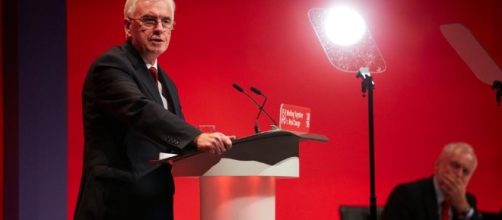In a speech, presented yesterday, which laid out a broad economic vision for a Labour government but with few details of specific policies, the Shadow Chancellor John McDonnell attacked the Conservatives’ programme of austerity and spending cuts, which he described as “a political choice, not an economic necessity”; McDonnell argued that the government should instead be increasing investment by recouping losses from large corporations and the super-rich. McDonnell was particularly critical of cuts to disability allowances, local council budgets, and social care, arguing that these forced the most vulnerable members of society to bear the burden of the Tories' failure to rejuvenate public finances.
Labour plans to tax rich to pay for investment
Instead, the Shadow Chancellor said a Labour government would increase regional investment, provide more funds for social care, and reverse cuts to benefits for disabled people. Keen to emphasise that this would not mean increased overall spending or more borrowing, McDonnell claimed that Labour would fund such measures through changes to tax regulations for high-earners and large businesses. Insisting that “there is nothing ‘left-wing’ about running an excessive deficit”, he suggested that Labour would fund its spending through a reform of HMRC to tackle tax avoidance schemes, increased pressure on tax havens to be transparent about which corporations and individuals held accounts there, and a “New Deal” for business, which will see the government providing more opportunities for education and training in return for businesses “paying their fair share”.
Shadow Chancellor criticises Tory Brexit plan
In addition, McDonnell heavily criticised the “shambolic” handling of Brexit by Theresa May’s government, though he shared no details of what he believed would be the ideal relationship between the EU and a post-Brexit Britain. While blasting the government for having “no coherent plan for Brexit and no coherent plan for how our country will prosper”, McDonnell seemed no less enthusiastic than the Tories to see an end to Britain’s membership of the European Union. Making the claim that the EU put “the interests of big business over ordinary people”, the Labour second-in-command reiterated that his party would not seek to block Article 50 in parliament, and would use “moral pressure” to influence the government’s Brexit plan rather than parliamentary procedure.
This element of the speech has drawn particular criticism from other left-wing parties: Green Party co-leader Caroline Lucas called it a sign of “premature capitulation” which weakened the position of pro-European advocates, and on Twitter Lib Dem leader Tim Farron said it showed his was the only pro-European partly left in the UK.
There is only one Pro European party left. It's the @libdems. Join us today https://t.co/UxdG6QNfgk https://t.co/2qqjq0Kxga
— Tim Farron (@timfarron) November 15, 2016

